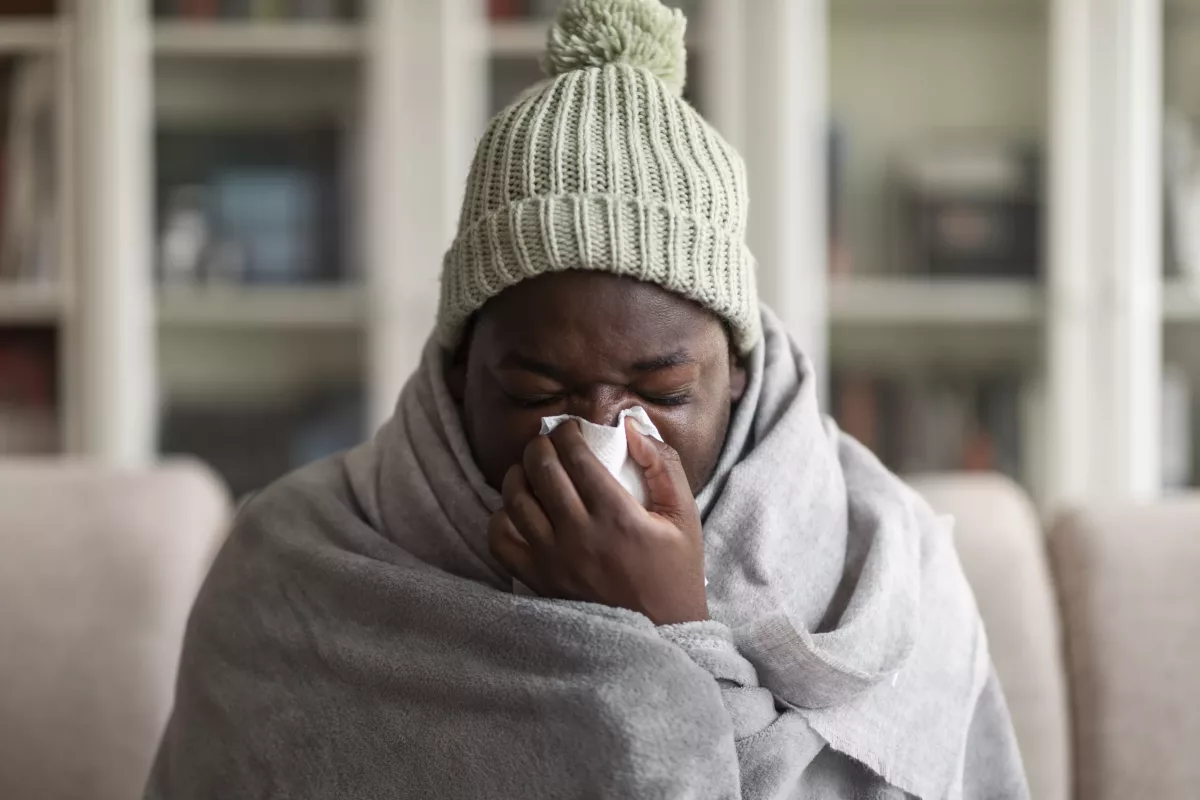A health condition that negatively affects the nose and throat and is caused by germs (viruses) is called the common cold. In most cases, this condition is harmless. Generally, it happens 2-3 times in adults per year. However, children may experience this condition more frequently.
Usually, it goes away within 10 days, but symptoms may last longer in smokers. Most people with the common cold do not need treatments, and symptoms improve on their own. Sometimes, conditions caused by germs are called upper respiratory tract infections.
Symptoms
Usually, the symptoms begin within 3 days after exposure to the virus. Check below some symptoms:
- Stuffy or runny nose
- Sore or scratchy throat
- Cough
- Sneezing
- Body aches
- Mild headaches
- Low-grade fever
Commonly, the mucus from the nose becomes thicker and green or yellow. Do not worry, this change is considered normal.
You should consult a healthcare professional if the following symptoms occur. For example:
Adults
- Shortness of breath
- Wheezing
- Intense sore throat
- Sinus pain
- Fever higher than 101.3 F or 38.5 C degrees
- Worsening of the symptoms
Children
- Fever greater than 100.4 F or 38 C degrees that lasts more than 3 days
- Breathing or wheezing problems
- Ear pain
- Unusual drowsiness
- Lack of appetite
- The symptoms become more intense
Causes
There are multiple viruses that may cause this condition. Mostly, the common cold happens due to rhinoviruses. Viruses usually enter the body through the mouth, eyes, or nose. Check below some ways how the viruses usually spread:
- By inhaling air droplets close to an infected person when he/she cough, sneeze, or talk
- Direct contact with an infected person
- Sharing objects with the virus (such as towels, toys, telephones, and others)
- Touching the mouth, nose, or eyes after exposure to the virus
Risk Factors
There are some factors that could elevate your risk of developing the common cold. For example:
- Age – Infants and young children are more likely to develop this condition.
- Weakened immune system – People with chronic health conditions or a weakened immune system are at higher risk of developing the common cold. The immune system may become weakened due to cancer and its treatments, certain medications (such as opioids), chronic health conditions, and others.
- Season – The common cold mostly happens in the fall and winter.
- Smoking – Using tobacco products or being around secondhand smoke significantly increases the risk of developing this condition.
- Exposure to the virus – Traveling or living in crowded conditions also elevates the chance of getting the common cold.
What Are The Potential Complications of The Common Cold?
People with this condition may experience some complications. They often occur in severe cases without treatment. For example:
- Middle ear infection – This condition occurs due to fluid buildup in the space behind the eardrum, and it causes swelling. Usually, middle ear infection occurs due to viruses or bacteria.
- Asthma – This condition may cause wheezing in people who do not have asthma. However, in people with asthma, the common cold may make it worse.
- Sinusitis – This complication may occur in both adults and children if the condition lasts.
- Other conditions – People with the common cold that lasts more than 10 days may experience other lung conditions (such as bronchitis or pneumonia). Moreover, those who suffer from asthma or have a weakened immune system also have an increased risk of lung diseases.
How to Prevent the Common Cold?
Unfortunately, there is no vaccine for this condition. To reduce the risk or prevent the common cold, you can consider the following tips. For example:
- Regularly wash your hands with soap and warm water. You can also use a hand sanitizer with at least 60% alcohol when water and soap are not available.
- Clean and disinfect surfaces that you touch frequently (such as light switches, electronics, doorknobs, kitchen and bathroom countertops, and others), especially if someone has a cold.
- It is advised to cover your mouth and nose when you cough or sneeze.
- You should not share personal items with family members, especially if you have been exposed to the virus.
- Avoid direct contact with infected people. If it is not possible, avoid touching your eyes, nose, or mouth.
- Adopt a healthy diet, regularly exercise, and practice good sleep habits because they may help you stay healthy.
Diagnosis
In most cases, people do not need medical attention for a common cold. You should see a doctor only if the symptoms do not improve within 10 days.
Healthcare professionals usually diagnose this condition based on symptoms. When it is not clear, doctors may perform some tests to confirm the condition and exclude others that cause similar symptoms. For example, a nasal or throat swab test or a chest X-ray.
Treatment
Unfortunately, the common cold cannot be cured, but with treatment, you can improve the symptoms and your quality of life in a few days. Check below some care tips that may help get rid of the condition without treatments and medicines:
- Drink plenty of fluids and rest
- Humidify the air
- Use saline nasal rinses
Pain Relievers
For people who experience sore throat, fever, or headaches, doctors may recommend over-the-counter (OTC) medications. They often recommend Acetaminophen or Ibuprofen for adults.
Furthermore, it is not allowed to give young children and teenagers Aspirin because it may cause a rare syndrome that can be life-threatening. It is called Reye’s syndrome.
The best options for children are Ibuprofen and Acetaminophen. However, before giving them to your children, discuss it with your healthcare professional.
Decongestant Nasal Sprays
These medicines are recommended for adults to relieve a stuffy nose. However, it can be used up to 5 days. Otherwise, it may cause the symptoms to return. In addition, children under 6 years should not use decongestant drops or sprays.
Frequently Asked Questions
What is the cause of the common cold?
The common cold is a viral infection of the upper respiratory tract. In most cases, it occurs due to rhinoviruses. However, it may also happen due to coronaviruses, parainfluenza, and adenoviruses. Commonly, a person becomes infected with the virus through airborne droplets, contaminated surfaces, or direct contact with an infected person.
How long does it take to recover from a cold?
Mostly, people recover within 10 days. However, the symptoms may last longer in people who smoke.
Does vitamin C help with colds?
This vitamin can help prevent colds. Furthermore, regular supplementation may help reduce the duration of the condition, and symptoms appear milder compared to people who do not administer this vitamin. If you have additional questions, ask your healthcare provider.




